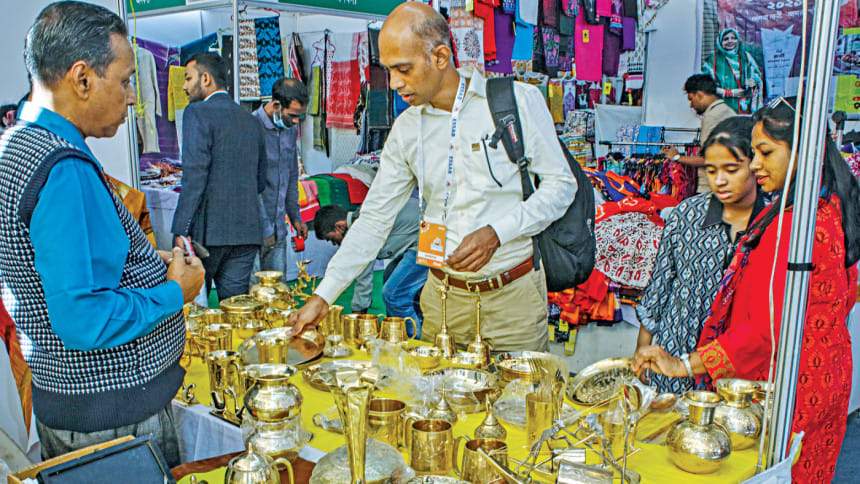Limited designs, outdated tech plaguing SMEs

Limited knowledge of designs and outdated technologies are common problems plaguing almost all clusters of small and medium-sized enterprises (SMEs) around Bangladesh, said speakers at a seminar yesterday.
According to SME Foundation, clusters are a concentration of enterprises within a geographical location producing similar products or services and having common strengths, weaknesses, opportunities and threats.
Most SME clusters produce almost similar products throughout their life but customers' choices are changing every day and they are not willing to purchase products of the same design, quality or shape at a high price, they said.
As a result, they are attracted to imported good-looking products, even when those are of a lower quality and cost more, they added.
The seminar on "The Role of Cluster-Based SMEs in Countering the Global Economic Recession" was organised by SME Foundation at Bangabandhu International Conference Center in Dhaka.
Existing technologies of different SME clusters should be updated through appropriate development projects to increase productivity and product quality, they said.
The government could grant bonded warehouse facilities to let area-based associations import raw materials to facilitate export of their products, they added.
There will always be a demand for uniquely designed products, said Khalid Mahmood Khan, co-founder of Kay Kraft, which retails fashionwear, accessories, home textile, handicrafts and handloom-made products.
Entrepreneurs need to think in the same way and the latest technologies have to be used to create new designs and products keeping in tune with the times, he said.
Amid the need to curtail imports for the pressure on foreign currency reserves, focus should be on making products whose raw materials are available in the country, he said.
Again, there is a big market for such products in the country, he added.
In addition, there should be more connections among the clusters and associated institutes, Khan added.
SME Foundation should take steps to prevent new designs of entrepreneurs from getting copied within a couple of days, which causes financial losses, urged Nilufar Yasmin, an entrepreneur from Rajshahi.
Entrepreneurs can now directly connect with retailers, which helps increase their profit margin to some extent amid the ongoing economic downturn, said Suborna Barua, an associate professor of the department of international business at the University of Dhaka.
Testing products is a prerequisite to grading a product but there are almost no relevant facilities in any cluster, said Nazneen Ahmed, country economist of UNDP Bangladesh.
Access to finance is one of the oldest problems for Bangladeshi entrepreneurs for a lack of knowledge about product quality and quality certifications, she said.
"As a result, they are lagging behind even with quality products in a few sectors," she added.
Most clusters have the potential to grow further but availability of skilled manpower is limited and entrepreneurs are not willing to develop skills at their own cost, Ahmed said.
Clusters could be considered as miniature economic zones without a boundary and various central support services could be designed for them, she added.
According to SME Foundation, there are currently 177 clusters in the country comprising 70,000 entities with an annual turnover of around Tk 30,000 crore.
Including all the standalone entities around the country, there were 78.8 lakh such business establishments in 2013, according to the Bangladesh Bureau of Statistics Economic Census 2013.
Of the roughly 10 lakh SMEs and 68 lakh cottage industries in Bangladesh, 7.21 per cent are being run by women.
Notable focus areas include light engineering and handloom products, embroidered quilts called "nakshi kantha", garments, handicrafts and leather goods.
Cottage, micro, small and medium enterprises account for nearly a fourth of Bangladesh's gross domestic product.

 For all latest news, follow The Daily Star's Google News channel.
For all latest news, follow The Daily Star's Google News channel. 



Comments